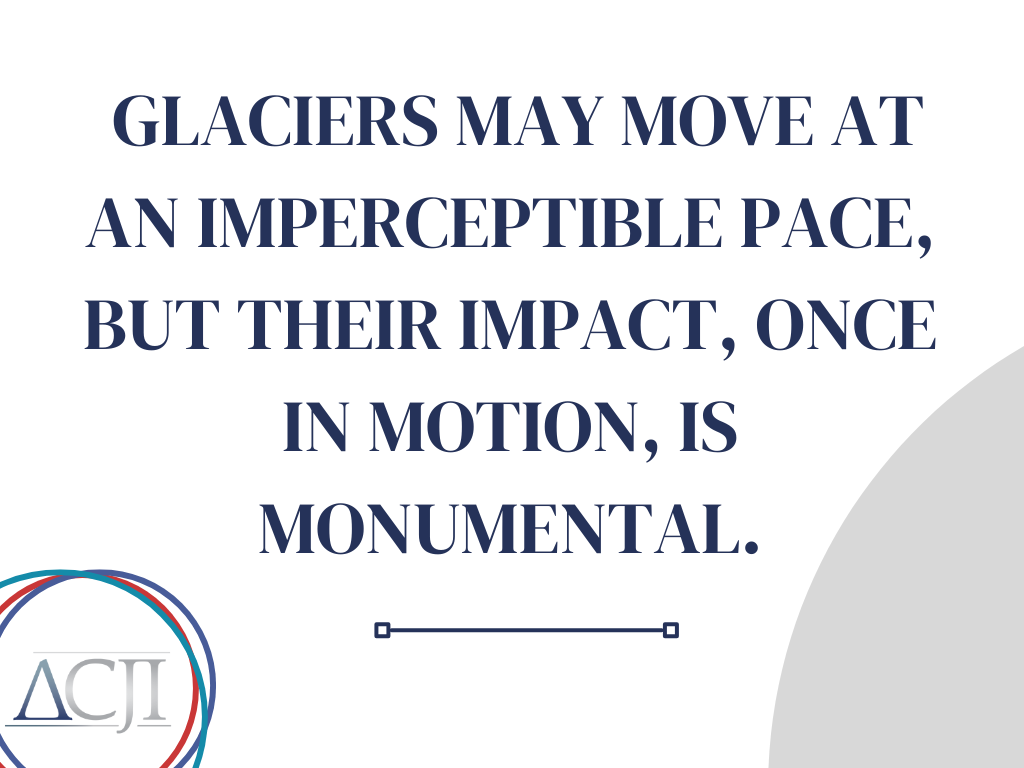Academy Alumni Address Small Wins and 'Glacially-Slow' Change
November 21, 2024 – Earlier this year, ACJI began a monthly alumni group for participants who
have completed our advanced Implementation Leadership Academy: Leading from The
Adaptive Space. (A class we affectionally call “102” for short.) As we have only had three 102 classes so far, the alumni group is small but mighty.
It never ceases to surprise us that criminal justice government agencies throughout the country have many similar challenges. The camaraderie and the commiseration between alumni may be the biggest advantage to the 102 alumni group we’ve seen so far.
In our latest gathering, the conversation started off like it typically does: sharing excitement over wins, specifically as it related to WOOP (Wish, Outcome, Obstacle, Plan), a tool that we teach in 102 to help leaders tackle goals through focused planning.
Benefits of Small Victories and Boundaries
One participant shared a success that he almost dismissed as “small and insignificant,” until several in the group cheered him on. It was a great reminder that small victories can be significant—they build momentum, boost confidence, and help you move forward, one step at a time.
As we dug into the conversation, we hit on something deeper: the need to set boundaries.
There was a common thread showing up in the conversation. We all wanted to make more time for what matters, which is difficult without clear boundaries. This led us to a revelation: setting boundaries prevents resentment within us, while being clear upfront creates kindness for others.
Boundaries allow you to say “yes” to what matters and “no” to what drains you. Boundaries help others know where you stand—ultimately creating mutual respect. It became clear that this practice of defining and holding boundaries is vital, not only to achieving your goals but to preserving your energy and staying positive on your journey.

Glacially Slow Justice System Change
The conversation shifted to barriers and frustrations, and the weight in the Zoom room shifted. Several of us shared our struggles with the pace of change in our work and lives, which often feels—to use Amanda Milligan’s memorable phrase—“glacially slow.” (Amanda is the District Director in the Second District for the Iowa Department of Corrections.)
We weren’t talking about the slew of unwelcome technical changes that rain down on most of us daily (like missed appointments, technology issues, and a phone ringing nonstop). In 102 and in the alumni group, the focus is on adaptive problems. Adaptive problems are:
- Hard to identify
- Take years to resolve
Adaptive problems typically involve changing the mindsets of individuals and the culture of an organization. It’s big stuff.
When you are working on an adaptive problem, change can feel like it’s barely moving, which can make you feel helpless or even hopeless. But then one of the participants offered a beautiful reminder that shifted all of our perspectives entirely: Think about the impact of a glacier. Glaciers may move at an imperceptible pace, but their impact, once in motion, is monumental.
A New Way of Thinking
This comparison sparked a whole new way of thinking for all of us. Glaciers play a dramatic role in shaping the environment around them. Their slow and persistent movement has sculpted valleys, carved out mountains, and created breathtaking landscapes over millennia. The pressure they exert can crack the hardest rock, leaving grooves that last for ages. When glaciers do move, their weight and momentum can change entire ecosystems, alter weather patterns, and create new rivers and lakes. This insight helped us see that while we may feel frustrated by the “glacial” pace of progress, the power behind steady, consistent effort is immense.
Many members of the group acknowledged that staying committed to goals, especially when success feels out of reach, is difficult. Often, we feel like we “should” be further along.
This conversation was a reminder that real progress is real slow. Small wins, those daily efforts to create change, add up over time. Just like glaciers, we’re exerting a force we may not fully appreciate yet, one that is reshaping the landscapes of our personal and professional lives. Each seemingly small success is a part of that cumulative impact.

Savor the Journey
Coincidentally, all of this ties into ACJI’s 10th Implementation Leadership Principle: Savor the Journey. ACJI has long asked Academy participants to celebrate each small step and recognize the power of staying committed, even when the path forward is uncertain.
In the end, our session felt like a microcosm of what it means to work toward meaningful change. It’s about holding on to hope even when success seems distant, cherishing the moments of progress, and staying open to the idea that change—even “glacial” change—is worth it. Like glaciers carving their path through stone, we, too, are leaving a lasting impact—one small win at a time.
Join Us for the Next Advanced Academy
Those who have completed the intro Implementation Leadership Academy are invited to ACJI’s Implementation Leadership Academy 102: Leading from The Adaptive Space class.
102 follows a similar style as the intro Implementation Leadership Academy—online, eight weeks—but the class size is smaller and includes one-on-one coaching. You’ll learn more about adaptive (people) problems that require individuals and systems to change their mindsets, behaviors, and approaches in response to evolving and uncertain circumstances. Learn more here.
Thanks to These Alumni Participants for Contributing to this Article
Amanda Milligan, District Director, Second District Iowa Department of Corrections
Kim Chmura, Community Corrections Chief, Virginia Department of Criminal Justice Services
Tyler Granberg, Executive Officer II, First District Iowa Department of Corrections
Danelle Gorra, MA3 – Project Manager, Minnesota Department of Corrections
Rachel L Miller, Statewide Evidence-Based Practices Coordinator, Minnesota Department of Corrections
Rob Metzger, Assistant Director, Sixth District Iowa Department of Corrections




